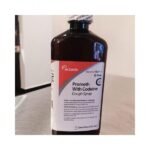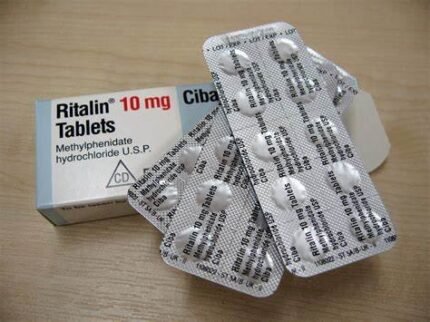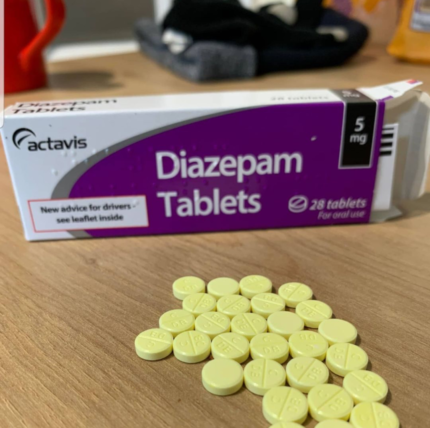

promethazine 25mg/5ml
£185.00 – £220.00Price range: £185.00 through £220.00
16 FL OZ
Codeine
Validity: 2yrs
Strength 200mg
Drug: 1622-62-44
Dosage Form: Syrup
Phosphate 10 mg. Alcohol 7%
Indication: Cough Suppressant
Each 5 mL contains Promethazine hydrochloride 6.25 mg.
| Manufacturer |
Actavis ,Arkon ,Workhardt ,Hi-tech |
|---|
Promethazine is an antihistamine that has a number of uses:
To relieve allergic conditions such as hay fever and skin rashes.
To prevent nausea (feeling sick) or vomiting (being sick), including when caused by motion sickness. It works by blocking certain chemicals (histamines) in your brain that can cause nausea and vomiting.
To make you feel sleepy. It may be taken for a few days only to help promote sleep in adults with sleeping problems.
Furthermore, Promethazine is available as an injection, a liquid or tablets (10 mg and 25 mg). In New Zealand, promethazine liquid and tablets can be bought from a pharmacy without a prescription, after consultation with a pharmacist (pharmacist-only medicine). promethazine 25mg/5ml

Easy-to-read medicine information about promethazine – what it is, how to take it safely and possible side effects. Promethazine is commonly called Phenergan or Allersoothe .promethazine 25mg/5ml.
| Type of medicine | Also called |
|---|---|
|
|
promethazine 25mg/5ml
Promethazine is an antihistamine that has a number of uses:
- To relieve allergic conditions such as hay fever and skin rashes.
- To prevent nausea (feeling sick) or vomiting (being sick), including when caused by motion sickness. It works by blocking certain chemicals (histamines) in your brain that can cause nausea and vomiting.
- To make you feel sleepy. It may be taken for a few days only to help promote sleep in adults with sleeping problems.
Promethazine is available as an injection, a liquid or tablets (10 mg and 25 mg). In New Zealand, promethazine liquid and tablets can be bought from a pharmacy without a prescription, after consultation with a pharmacist (pharmacist-only medicine).
| Promethazine must not be used for sedation of children (ie, to make children sleep. It can cause severe breathing problems). |
Dose
Promethazine tablets are available in 2 strengths: 10 mg and 25 mg. The dose of promethazine depends on its use. Your doctor or pharmacist will advise you on the best dose for you. The following is a guide.
- Allergies: One to three 25mg tablets taken as a single dose at night, or one to two 10mg tablets taken 2 to 3 times daily.
- Motion sickness: 25mg taken the night before travel and repeated after 6 to 8 hours on the following day if needed.
- Sedation: One to three 25mg tablets taken as a single dose at night .promethazine 25mg/5ml

Tylenol with codeine
Actavis Codeine, in any formulation, is a controlled substance. Listed as a Schedule II, III, and V drug by the U.S. Drug Enforcement Administration (DEA) depending on the specific type of medication and the dose of codeine contained in it.
People who abuse the drug may attempt to crush, chew, snort, or inject the tablets. A common method of abuse is to combine codeine with soda (a mixture known as syrup, sizzurp, purple drank, barre, or lean) and sometimes hard candies as well. Some users mix codeine syrup with alcohol .promethazine 25mg/5ml
codeine side effects
Ongoing use of prescription actavis codeine medications may negatively impact multiple aspects of an individual’s health. Long-term health consequences of codeine include:
- Breathing problems during sleep, including sleep apnea.
- Heart problems with an increased danger of heart attack and heart failure.
- Codeine appears to pose a higher risk for experiencing adverse cardiovascular events than hydrocodone.
- Nervous system problems like:
- Higher pain sensitivity.
- Heightened risk of falls and injury as a result of dizziness and impaired coordination.
- Endocrine/hormonal-related problems such as:
- Low testosterone levels.
- Sexual dysfunction.
- Lowered sexual interest.
- Osteoporosis.
- Irregular periods.
- Lactation, unrelated to childbirth.
- Fatigue.
- Impaired immune system functioning.
The decreased respiratory drive associated with codeine abuse has the potential to affect the brain. When breathing is inadequate, the brain and other body tissues/organs may not receive enough oxygen. This situation, called hypoxia, can damage and deteriorate parts of the brain and may also result in a coma. promethazine 25mg/5ml.
Opioid use has also been associated with parts of the brain relating to:
- Decision-making skills.
- Stress response.
- Behavior regulation.
In addition to the physical health issues described, long-term opioid use can adversely affect an individual’s mental health and lead to higher rates of depression.
Some common effects also include
- Chronic constipation.
- Low sex drive.
- Irregular menstruation.
- Muscle tension as well as twitches.
- Tolerance, in which the person needs to use more of the drug to get the same effect as well as Physical dependence.
- Withdrawal symptoms when the person stops using, which can include cravings, abdominal cramps, runny nose, aching muscles and joints, fever, chills, sweating, restlessness, irritability, and depression.

UK SHIPPING
24 Hour Tracked & Insured - Usually delivered the next working day, Text & Email Tracking provided, no signature required
Delivery is charged at £5 & requires no signature, It is posted direct through your door (providing it fits) with proof of postage.
FREE SHIPPING on all orders over £200, It is posted direct through your door (providing it fits) with proof of postage.
- A Weekday Guaranteed Services will cost £6.99
- A Saturday Guaranteed Service will cost £10.99 (order MUST be received By Friday no later than 3:45pm)
Orders are delivered Monday - Saturday , We ship Monday - Friday
Guarantees are on Royal Mails part, We will dispatch on time!
Discreet and inconspicuous packaging on all orders.
INTERNATIONAL SHIPPING
*International Shipping Fully Insured and Trackable charged at an International Flat Rate Fee £9.50.
All international mail generally leaves the UK within 1 working day. Unfortunately we cannot predict how long purchases will be processed through networks abroad.
IMPORTANT: It is up to you the customer, not us, to determine whether any products you wish to order are legal in your country.
We cannot accept responsibility for any repercussions or replace any confiscations for any products brought from Starplug.
This applies to ALL international customers, we will send on the understanding all responsibility is held by you, the customer, & all laws respective of your country have been obeyed.















Reviews
There are no reviews yet.